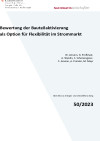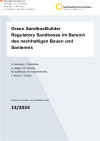Suchergebnisse
Energy-Sponge-Bruck (Energieschwamm Bruck an der Mur)
The aim of the exploration-study for the urban region Bruck/Oberaich "Energieschwamm Bruck" or "Energy-Sponge-Bruck" was to establish clear and stringent basics for a flexible development of the future energy system. Therefore an energy development concept as well as a cadaster for short-term implementation measures had been applied. The structured, Bruck-based approach acts as framework for a general energy-conception-method, valid for small and medium urban regions with 10,000 to 20,000 inhabitants.
Morphology of a City - The Austrian Built Environment
This study uses several data sources to analyze the effects of the research programe "Haus der Zukunft" ("Building of Tomorrow") on the Austrian housebuilding industry and the built environment.
Contracting als Instrument für das Althaus der Zukunft

Weiterentwicklung von Contracting-Modellen für umfassende Sanierungs(dienstleistungs) pakete.
Economic usage of Photovoltaic electricity in buildings
The aim of this project is to optimise the direct usage of PV-electricity produced in buildings. The main question concerning the right dimensioning of the PV generator should be answered in order to achieve a high direct usage rate of produced PV electricity under economic considerations. This analysis will be carried out for various building categories. As result, a calculation method will be developed (incl. report), in order to achieve the optimal, most economic PV system for various building categories and user typologies.
Nutzererfahrungen als Basis für nachhaltige Wohnkonzepte

Befragung von 350 ÖkohausbewohnerInnen in Österreich, exemplarische Nutzerbeteiligung zur Bewertung innovativer Gebäudekonzepte mittels Fokus-Gruppendiskussionen, Erarbeitung eines innovationsorientierten Beteiligungsmodells
PH Office - Criterions for energy-efficient office buildings
The passive house standard and energy-efficient building technologies are getting increasingly important for office buildings, too. However, standardisation is not completed on the same level as known from the residential building sector. The project at hand brings in definitions and makes a suggestion on a standardised calculation method for office buildings in passive house quality.
Begleitung der Forschungsinitiative "Zukunftssicheres Bauen"
Die ÖGUT begleitet die Forschungsinitiative "Zukunftssicheres Bauen" des Fachverbands der Stein- und keramischen Industrie und stellt den Ergebnistransfer zum Forschungsprogramm "Haus bzw. Stadt der Zukunft" sicher.
SOFC4City - SOFC-Abwärmenutzung für Gebäude und Industrie
Das hohe Abwärmetemperaturniveau der SOFC-Brennstoffzelle eignet sich prinzipiell um unterschiedliche Wärme- und Stromverbraucher (Wohnbau, Industriebetriebe, ...) bedienen zu können. Ziel ist es, die Abwärme der Brennstoffzelle auf mehreren Temperaturniveaus zur Verfügung zu stellen, um so die Vorteile der Brennstoffzelle besser zu nutzen und den Einsatz für den städtischen Bereich zu prüfen. Einerseits werden die rechtlichen und marktwirtschaftlichen Rahmenbedingungen dazu erhoben, anderseits wird die technische Ausführbarkeit mittels CFD-Simulationen der Wärmeauskopplung sondiert.
"Energy saving" - the best PR strategy for sustainable housing?

The project aim is the clarification and PR-reevaluation of the thematic field "energy/energy saving" as a chance to study users and market forces close and factual to have a secure base for the development of new concepts, slogans and incentives in Austria.
Einfamilienhaus und verdichtete Wohnformen - eine Motivenanalyse

Die Studie konzentriert sich auf die Darstellung der Gründe für die zögerliche Realisierung flächensparender, verdichteter Wohnformen einerseits und für die dominierende Bevorzugung des freistehenden Einfamilienhauses andererseits. Sie beschränkt sich jedoch nicht auf die Deskription der entscheidenden Motive für die jeweilige Wohnoption, sondern analysiert auch die Bestimmungsfaktoren und Rahmenbedingungen, unter denen die jeweiligen Motive entstehen bzw. entstanden sind. Auf der Basis dieser Analyse werden Alternativen vorgeschlagen und hinsichtlich ihrer Effektivität und Realisierungschancen evaluiert.
Bewertung der Bauteilaktivierung als Option für Flexibilität im Strommarkt

Um die Forschungsfrage dieser Studie nach dem zukünftigen Stellenwert der Bauteilaktivierung für die Energieversorgung zu beantworten, wurde ein Schätzmodell zum erwartbaren Neubau von Wohn- und Dienstleistungsbauten bis 2040 sowie der Sanierung von Bestandsbauten entwickelt.
Schriftenreihe
50/2023
W. Amann, G. Preßmair, A. Stipsits, S. Schoisengeier, C. Amann, A. Preisler, M. Mayr
Herausgeber: BMK
Deutsch, 75 Seiten
Downloads zur Publikation
Wirtschaftliche Nutzung von Photovoltaik-Strom in Gebäuden
Ziel des Vorhabens ist die Optimierung der Direktnutzungsquote des erzeugten PV-Stroms im/am Gebäude. Dabei wird insbesondere die Fragestellung beantwortet, mit welcher Anlagendimensionierung eine möglichst optimale Direktnutzungsquote von PV-Strom unter wirtschaftlichen Gesichtspunkten erreicht werden kann. Als Ergebnis wird ein Berechnungsmodell entwickelt (inkl. Bericht), das für die Ermittlung der wirtschaftlich optimalen Direktnutzungsquote von PV-Strom für unterschiedliche Gebäude- und Nutzungstypen herangezogen werden kann.
OPEN HEAT GRID - Offene Wärmenetze in urbanen Hybridsystemen
Primäres Forschungsthema von OPEN HEAT GRID war die Untersuchung der Möglichkeiten zur Forcierung der Einspeisung industrieller Abwärme in bestehende Fernwärmenetze. Die Projektergebnisse zeigen, dass Abwärme nicht kostenlos ist: trotz minimaler variabler Kosten müssen sich die Investitionskosten in üblichen Amortisationszeiten rechnen. Die Analyse zeigt, dass es keiner staatlichen Regelung im Sinne einer Einspeiseverpflichtung oder Marktliberalisierung bedarf. Jedoch liegen aus ökonomischer Sicht Informationsasymmetrien vor, wodurch es möglich ist, dass rationale Entscheidungen nicht zustande kommen.
Erfolgsfaktoren zur Markteinführung innovativer Wohnbauten

Eine empirische Analyse wesentlicher hemmender und fördernder Faktoren für die Marktdiffusion ausgewählter Technologien, sowie von unterschiedlichen Gesamtkonzepten des innovativen Wohnbaus.
Ist ökologisches Bauen in der Masse kostengünstig umsetzbar?
Beim Passivwohnbau Utendorfgasse wurden extrem günstige Baukosten erreicht. Würden sich die Baukosten im Falle einer Ausführung mit ökologischen Materialien verändern? Anhand des Ökologischen Bauteilkatalogs und eigener Kostenkennwerten ähnlich großer Projekte werden die Mehr/Minderkosten ermittelt.
Smart Energy Efficient Active Buildings and Building Clusters
Im Rahmen des Projekts wurden ausgewählte Kombinationen von Einzelgebäuden, Gebäudeverbänden und deren Energieversorgungsvarianten auf ihre Eignung und ihren Beitrag zur Primärenergie- und Treibhausgasreduktion untersucht. Ziel war es, Empfehlungen zur Abbildung und Bewertungsmethodik von Gebäuden und Gebäudeverbänden abzuleiten, die "Nahezu Null" Energie verbrauchen und Energie aus erneuerbaren Quellen nutzen.
Green SandboxBuilder: Regulatory Sandboxes im Bereich des nachhaltigen Bauens und Sanierens

Im Projekt "Green SandboxBuilder" wurde erstmals in Österreich der Bedarf an Regulatory Sandboxes für ökologisch nachhaltige und klimawirksame Vorhaben im Baubereich systematisch erhoben. Die Umsetzung von Regulatory Sandboxes im österreichischen Bausektor kann dazu beitragen, die Einführung von technologischen, prozessualen und sozialen Innovationen entscheidend zu beschleunigen und somit die Nachhaltigkeitsziele zu erreichen.
Schriftenreihe
13/2024
G. Leimüller, J. Rohrhofer, A. Gerger, Ch. Schranz, M. Aichholzer, M. Schachenhofer, C. Benes, F. Ozclon
Herausgeber: BMK
Deutsch, 71 Seiten
Downloads zur Publikation
BIMaterial Process Design for Material Building Pass
Building Information Modelling supported compilation of a Material Building Pass; as a qualitative and quantitative documentation of the material composition of, and the material distribution within, a building structure. This project is a central milestone towards standardized, BIM-generated building material passes.
Akzeptanzverbesserung von Niedrigenergiehaus-Komponenten

Sozialwissenschaftliche Untersuchung von Akzeptanz und Verbreitungsstrategien für kontrollierte Be- und Entlüftungssysteme mit Wärmerückgewinnung und damit gekoppelten Heizungssystemen in Niedrigenergie- und Passivhäusern.
Digitale Transformation der österreichischen Bauwirtschaft und Auswirkungen auf die Erwerbstätigen
In einer Trendanalyse werden wahrscheinliche Auswirkungen der digitalen Transformation in der österreichischen Bauwirtschaft auf den Branchen-Arbeitsmarkt untersucht. Auf Basis von Feedback von BranchenexpertInnen wird für die kommenden fünf bis zehn Jahre analysiert, für welche Berufsgruppen digitalisierungsinduzierte Effekte eher zu einer steigenden vs. sinkenden Arbeitskraftnachfrage führen.
